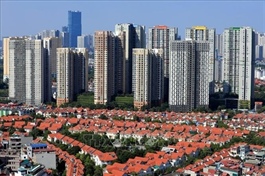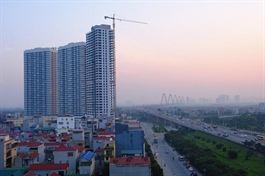Real estate needs urgent legal, supply, and capital reform
Real estate needs urgent legal, supply, and capital reform
Dr. Can Van Luc, a member of the National Financial and Monetary Policy Advisory Council, gave his view on the real estate sector during the VIR-held seminar "Untangling Real Estate: Promoting Growth" on April 19.
According to Luc, there is a "connected quadrilateral" between the banking, securities, insurance, and real estate markets. If there is a problem in one of these four areas, it will have repercussions on the others and the economy as a whole. There are currently three major issues that must be resolved in the real estate market.
Currently, legal issues present the first and greatest obstacle. There are more than a hundred extremely complicated laws, decrees, and circulars that govern the land, construction, and real estate sectors. There are numerous overlapping and inconsistent regulations between the laws on Land, Housing, and Real Estate Business, which permit foreigners to purchase or own the right to use land and real estate.
The second concern involves supply and demand, and therefore price. Few initiatives are approved in a timely manner, largely due to the aforementioned legal issues, resulting in a deficiency in supply, specifically of low-income and social housing. Real estate prices in Vietnam are disproportionately high compared to people's incomes due to a scarcity of supply, increased costs, and intermediary price inflation.
The third factor is capital, which is anticipated to increase by approximately 3 per cent in the first quarter of 2023 compared to the previous quarter, and higher than the overall credit growth of 2.06 per cent. At the end of February this year, total outstanding real estate credit had decreased to approximately $42.6 billion, representing a little over 21 per cent of the economy's total outstanding loans. According to the State Bank and the Ministry of Construction, housing loans are estimated to make up 67 per cent of the total, while real estate commerce accounts for the remaining 33 per cent.
According to Luc, from now until 2030, Vietnam will require approximately $110.7 billion per year in medium and long-term capital in addition to bank credit capital.
In proposing solutions for sustainable market development, Luc advised management agencies to see clearly, saying, "Vietnam has a great deal of room to develop housing credit and real estate in industrial zones as segments are still scarce. Therefore, it is crucial to take a broader approach to development than the financial market has, by creating development while still controlling risk, and seizing new opportunities."
In addition, Luc proposed accelerating the revision of pertinent ordinances, including the laws on securities, enterprise, land, housing, real estate businesses, bidding, and construction.
"There are precise regulations regarding suitable credit, capital, and financial policies in the real estate sector, along with guidelines that permit the establishment of specialised financial institutions, such as funds for social housing, trusts, refinancing agencies for mortgages, and long-term securitisation," Luc stated.
Real estate companies need to have a detailed and executable plan to pay off maturing corporate bond debt and diversify their capital sources. Capital mobilisation strategies developed by businesses must be associated with specific capital use purposes. In addition, these businesses must reduce financial leverage, limit investment spread, honour investor commitments, and increase transparency and professionalism through proper credit records and security issuance dossiers.

























